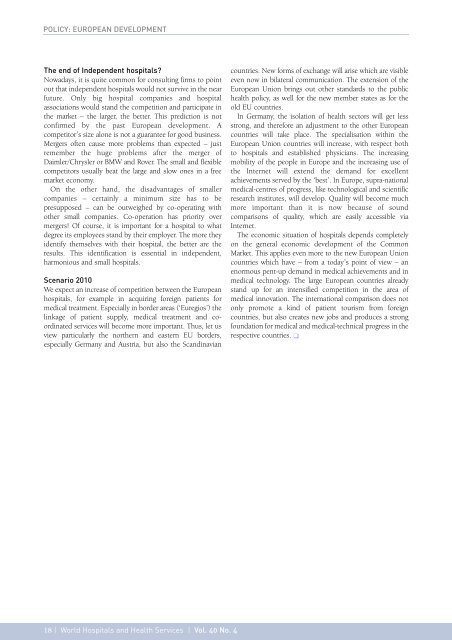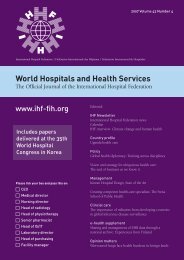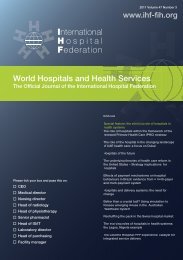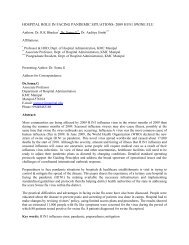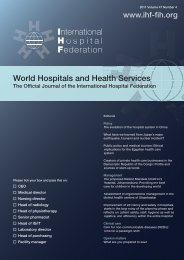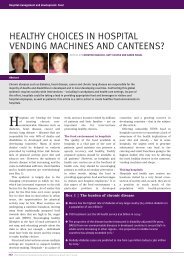World Hospitals and Health Services - International Hospital ...
World Hospitals and Health Services - International Hospital ...
World Hospitals and Health Services - International Hospital ...
You also want an ePaper? Increase the reach of your titles
YUMPU automatically turns print PDFs into web optimized ePapers that Google loves.
POLICY: EUROPEAN DEVELOPMENT<br />
The end of Independent hospitals?<br />
Nowadays, it is quite common for consulting firms to point<br />
out that independent hospitals would not survive in the near<br />
future. Only big hospital companies <strong>and</strong> hospital<br />
associations would st<strong>and</strong> the competition <strong>and</strong> participate in<br />
the market – the larger, the better. This prediction is not<br />
confirmed by the past European development. A<br />
competitor’s size alone is not a guarantee for good business.<br />
Mergers often cause more problems than expected – just<br />
remember the huge problems after the merger of<br />
Daimler/Chrysler or BMW <strong>and</strong> Rover. The small <strong>and</strong> flexible<br />
competitors usually beat the large <strong>and</strong> slow ones in a free<br />
market economy.<br />
On the other h<strong>and</strong>, the disadvantages of smaller<br />
companies – certainly a minimum size has to be<br />
presupposed – can be outweighed by co-operating with<br />
other small companies. Co-operation has priority over<br />
mergers! Of course, it is important for a hospital to what<br />
degree its employees st<strong>and</strong> by their employer. The more they<br />
identify themselves with their hospital, the better are the<br />
results. This identification is essential in independent,<br />
harmonious <strong>and</strong> small hospitals.<br />
Scenario 2010<br />
We expect an increase of competition between the European<br />
hospitals, for example in acquiring foreign patients for<br />
medical treatment. Especially in border areas (‘Euregios’) the<br />
linkage of patient supply, medical treatment <strong>and</strong> coordinated<br />
services will become more important. Thus, let us<br />
view particularly the northern <strong>and</strong> eastern EU borders,<br />
especially Germany <strong>and</strong> Austria, but also the Sc<strong>and</strong>inavian<br />
countries. New forms of exchange will arise which are visible<br />
even now in bilateral communication. The extension of the<br />
European Union brings out other st<strong>and</strong>ards to the public<br />
health policy, as well for the new member states as for the<br />
old EU countries.<br />
In Germany, the isolation of health sectors will get less<br />
strong, <strong>and</strong> therefore an adjustment to the other European<br />
countries will take place. The specialisation within the<br />
European Union countries will increase, with respect both<br />
to hospitals <strong>and</strong> established physicians. The increasing<br />
mobility of the people in Europe <strong>and</strong> the increasing use of<br />
the Internet will extend the dem<strong>and</strong> for excellent<br />
achievements served by the ‘best’. In Europe, supra-national<br />
medical-centres of progress, like technological <strong>and</strong> scientific<br />
research institutes, will develop. Quality will become much<br />
more important than it is now because of sound<br />
comparisons of quality, which are easily accessible via<br />
Internet.<br />
The economic situation of hospitals depends completely<br />
on the general economic development of the Common<br />
Market. This applies even more to the new European Union<br />
countries which have – from a today’s point of view – an<br />
enormous pent-up dem<strong>and</strong> in medical achievements <strong>and</strong> in<br />
medical technology. The large European countries already<br />
st<strong>and</strong> up for an intensified competition in the area of<br />
medical innovation. The international comparison does not<br />
only promote a kind of patient tourism from foreign<br />
countries, but also creates new jobs <strong>and</strong> produces a strong<br />
foundation for medical <strong>and</strong> medical-technical progress in the<br />
respective countries. ❑<br />
18 | <strong>World</strong> <strong><strong>Hospital</strong>s</strong> <strong>and</strong> <strong>Health</strong> <strong>Services</strong> | Vol. 40 No. 4


